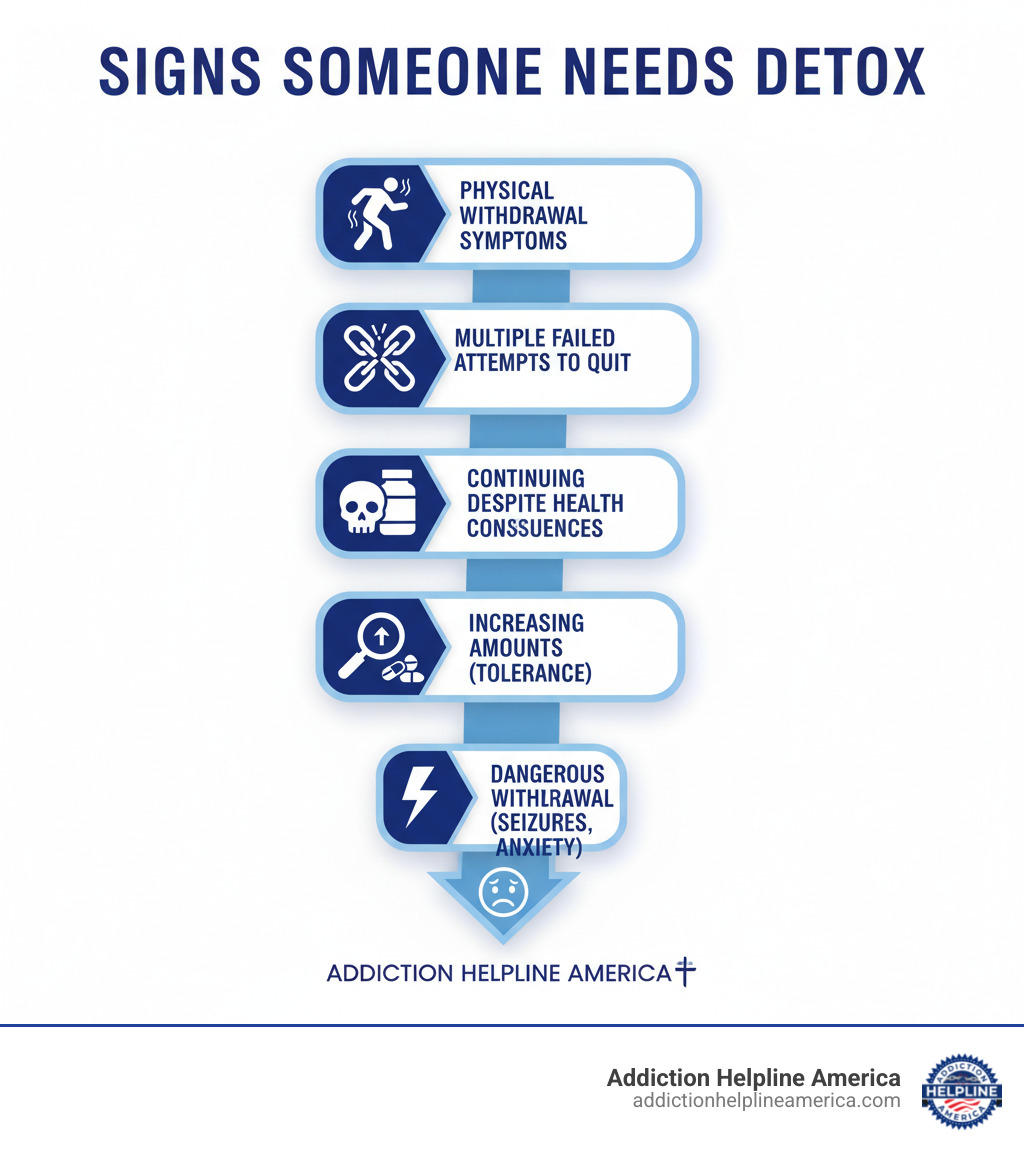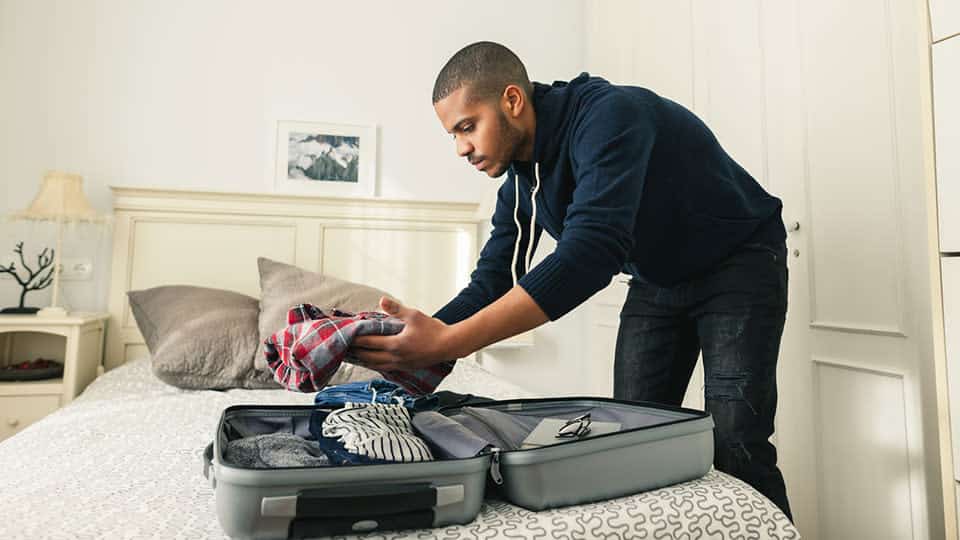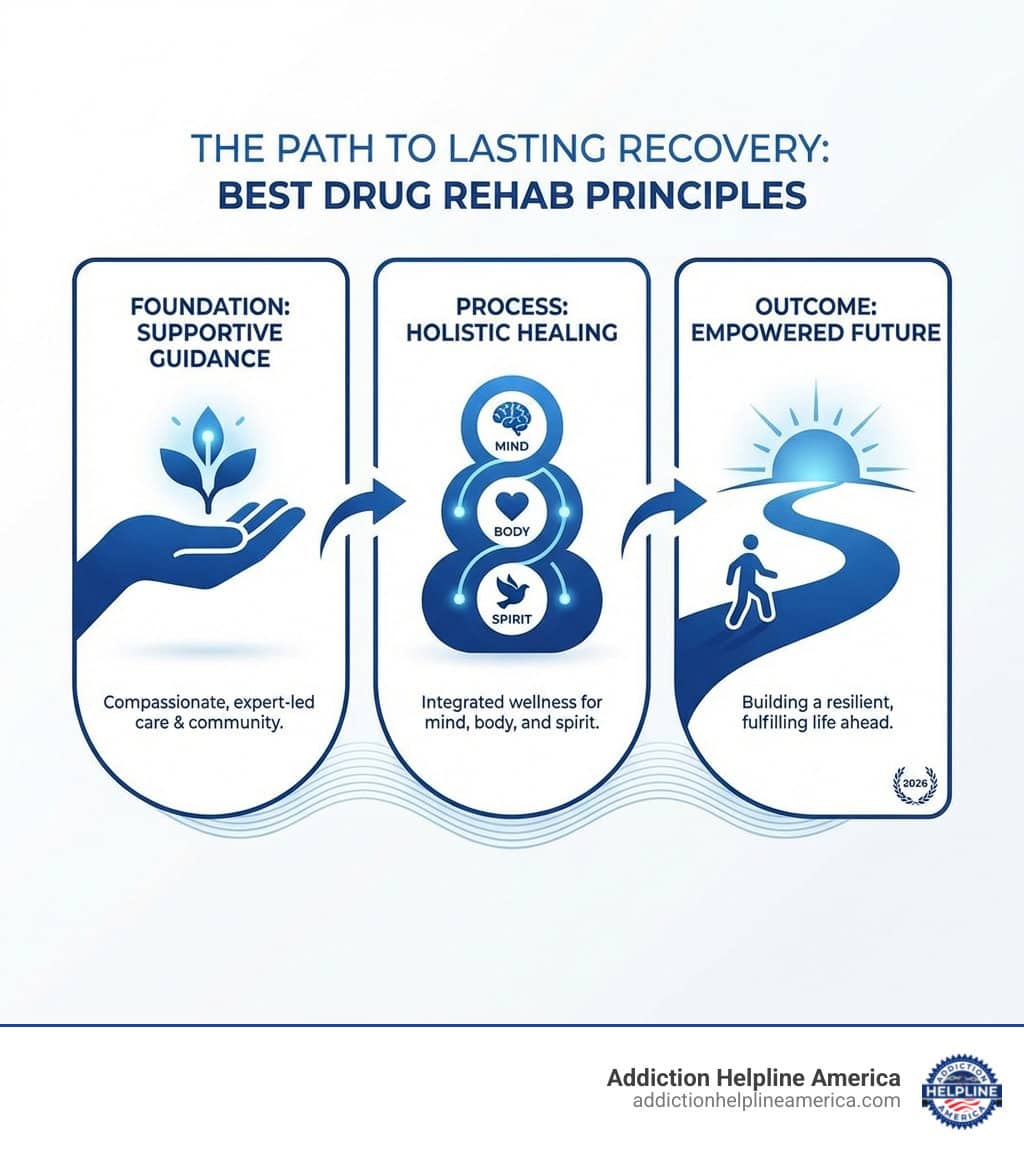
Understanding Detox Centers: Your First Step to Recovery
Detox centers are specialized medical facilities providing safe, supervised environments for individuals to withdraw from addictive substances. These centers offer 24/7 monitoring, medical support, and symptom management during the critical first days of recovery.
Key things to know about detox centers:
- Purpose: Safely remove substances from your body while managing withdrawal symptoms
- Duration: Typically 7-10 days, depending on individual needs
- Medical Support: Trained staff, including nurses and addiction counselors, provide round-the-clock care
- Cost: Publicly funded facilities may be free or low-cost; private centers vary in price
- What Comes Next: Detox prepares you for rehab, counseling, and long-term recovery support
Detoxification is a vital step where your body is weaned off addictive substances in a carefully measured way. For substances like alcohol, opioids, or benzodiazepines, withdrawal can be dangerous—even life-threatening—without medical support. Detox centers exist to keep you safe during this critical transition.
Detox is not rehabilitation. It’s the necessary first step before entering outpatient or residential treatment programs. Detox focuses on your physical health and withdrawal symptoms, while the deeper work of addressing the roots of addiction comes next.
At Addiction Helpline America, our experienced team helps individuals and families steer the overwhelming process of finding quality detox centers. We have years of experience connecting people with the right treatment resources to begin their healing journey.
This guide will walk you through what happens during detox, how to find accredited facilities, what to expect, and how to prepare for the next phase of recovery.

Essential detox centers terms:
What is Detox and Why is it a Crucial First Step?
Deciding to break free from addiction is a huge step, and detox is where the journey begins. Detox is the process of safely removing addictive substances from your body under professional medical supervision. It’s about managing the physical withdrawal symptoms that occur as your body adjusts to being without drugs or alcohol.
A detox center provides a safe, monitored environment where trained medical professionals watch over you 24/7. The primary goal is physical stabilization. Since your body has become dependent on substances, it needs careful support to adjust.

The purpose of detox is to manage withdrawal symptoms safely and prepare you for long-term treatment. While some symptoms like nausea and anxiety are uncomfortable, others can be dangerous without medical care.
For substances like alcohol, benzodiazepines, and opioids, withdrawal can be severe. Alcohol and benzodiazepine withdrawal can trigger life-threatening seizures. Opioid withdrawal causes such intense pain and discomfort that relapse is common without medical support. Detox centers provide medications and monitoring to keep you safe and comfortable during these critical first days.
Detox is not rehab. It is a vital preparatory stage. Detox addresses your body’s physical dependence, getting substances out of your system and stabilizing your health. It does not address the psychological reasons for addiction.
Think of detox as clearing the fog. Once your body is stable, you’re ready for the deeper work of therapy and counseling to build a life in recovery. For more information, explore our resources on Detox Programs.
Detox is also where you begin building Recovery Capital—the personal and social resources that support your recovery. By stabilizing your health in a safe place, detox creates a foundation of hope and helps you gather the strength needed for a sustained recovery. It’s the essential bridge from active addiction to a new life.
Exploring the Different Types of Detox Programs
Not all detox programs are the same, and understanding the differences helps you find the right fit. While every detox center aims to help you withdraw safely, the level of medical care varies based on your needs, the substance used, and your overall health.
| Feature | Medical Detox | Social Detox |
|---|---|---|
| Medical Supervision | 24/7 medical staff (doctors, nurses) | Monitoring by trained support staff, limited medical |
| Medication Use | Frequent, to manage severe withdrawal symptoms (MAT) | Seldom, for comfort measures only |
| Typical Setting | Inpatient, hospital-like facility | Non-medical residential setting |
| Substances Best Suited | Alcohol, Benzodiazepines, Opioids, Polysubstance | Stimulants, Marijuana, less severe dependence |
When Medical Detox Is Necessary
Medical detox is the most intensive option, designed for those facing serious health risks during withdrawal. It provides 24-hour oversight by doctors and nurses who use medications to prevent dangerous complications. This approach, often called Medication-Assisted Treatment (MAT), uses medicine in a controlled way to help your body adjust safely.
- Alcohol and Benzodiazepine Withdrawal: Stopping substances like alcohol, Xanax, or Valium abruptly can cause life-threatening seizures or delirium tremens (DTs). Medical staff use medications to prevent these crises.
- Opioid Withdrawal: While not typically fatal, withdrawal from heroin, fentanyl, or painkillers is painful and uncomfortable, often leading to relapse. Medications like buprenorphine can significantly reduce symptoms.
- Polysubstance Dependence: Withdrawing from multiple substances at once is complex and unpredictable, making expert medical management essential.
Substance-Specific and Social Detox Programs
Quality detox centers tailor their approach to the specific substance. For stimulants like cocaine or methamphetamine, withdrawal is more psychologically challenging, with severe depression and anxiety. Marijuana withdrawal is milder but still benefits from a supportive environment.
This is where social detox programs are valuable. They offer a safe residential setting with trained staff for monitoring and encouragement. Medical oversight is less intensive, and the focus is on emotional support and peer connection.
Call Now – Your Journey to Recovery Begins Today!

Take the first step towards a healthier life! Call now to connect with our compassionate team and start your recovery journey today. Your path to healing awaits!
Our recovery specialists are available 24/7 to provide support, and all calls are confidential and free. Reach out anytime – we’re here to help!
The key to successful withdrawal management is alleviating dangerous symptoms before they become crises. The right choice between medical and social detox depends on your individual circumstances, which is determined during an assessment at a quality detox center. Trained professionals will help you find the safest and most comfortable level of care.
How to Find and Prepare for Treatment at Detox Centers
Finding the right detox center can feel overwhelming, but we’re here to help you steer the process with clarity and compassion.
How to Find Licensed and Accredited Detox Centers
Licensure and accreditation are your assurance that a facility meets rigorous standards for safety and care.
- State Licensure: Every legitimate detox center must be licensed by its state’s health department. This is a baseline requirement for safe operation. Always verify a facility’s license.
- National Accreditation: Organizations like The Joint Commission (JCAHO) and CARF offer accreditation, which signals a facility’s commitment to a higher standard of care beyond basic requirements.
Finding trustworthy information can be challenging in a crisis. Addiction Helpline America maintains a network of licensed and accredited detox centers and offers free, confidential guidance. You can also use government resources like FindTreatment.gov or start with our Addiction Helpline America’s Treatment Locator.
Understanding Costs and Eligibility
The financial side of treatment shouldn’t be a barrier to getting help. Publicly funded detox centers are often free or low-cost but may have waitlists. Private centers typically offer quicker admission and more amenities at a higher price.
Most private insurance plans cover addiction treatment, including detox, due to mental health parity laws. We can help you verify your benefits. If you’re uninsured, state-funded programs are available based on income and residency.
The admission process begins with a phone assessment to review your history and determine the right level of care. Most facilities require patients to be over 18 with a clear need for detox.
Preparing for Your Stay
A typical detox stay is 7 to 10 days, but this can vary based on the substance, severity of dependence, and your individual medical needs.
When packing, think simple and comfortable.
- What to Bring: Photo ID, insurance card, a few changes of comfortable clothing, essential unscented toiletries, a book or journal, and any prescribed medications in their original bottles.
- What to Leave at Home: Electronics, weapons, scented products, clothing with drug or alcohol logos, outside food/drinks, and any non-prescribed substances. This helps create a safe, distraction-free environment focused on healing.

Finally, be completely honest with the detox staff about your substance use and medical history. Withholding information can be dangerous. The medical team needs the full picture to provide the best and safest care. Their role is to help you, not to judge.
Frequently Asked Questions about the Detox Process
Taking the first step toward recovery brings up many questions. Here are answers to some of the most common concerns about detox centers.
Is detox the same as a full rehabilitation program?
No, detox is not the same as rehab. Detox focuses on the physical side of addiction: safely removing substances from your body and managing withdrawal under medical supervision. It stabilizes your body. Rehabilitation is the next step, addressing the psychological, emotional, and behavioral roots of addiction through therapy and counseling to build skills for long-term sobriety.
How long does a typical stay at detox centers last?
A typical stay is 7 to 10 days. However, the exact length depends on the substance used, the severity of dependence, and individual health needs. The clinical team at a detox center creates a personalized plan to ensure you are physically and mentally stable before moving to the next phase of recovery.
How can family members best support someone in detox?
Your support is vital. Here are a few ways to help:
- Educate Yourself: Learn about addiction and the detox process to offer empathy and understanding.
- Offer Encouragement: Remind your loved one of their strength and your belief in their ability to heal.
- Respect Boundaries: Follow the facility’s rules on visitation and communication. This protected space is crucial for healing.
- Participate in Family Programs: Many centers offer family therapy or support groups. Engaging shows your commitment to healing together.
- Plan for What’s Next: Work with your loved one and the detox staff to plan for post-detox treatment, such as rehab or therapy.
- Take Care of Yourself: Supporting someone is draining. Lean on your own support system, like friends or groups such as Al-Anon.
Your support, combined with professional care, dramatically increases the chances of long-term recovery.

Call Now – Your Journey to Recovery Begins Today!

Take the first step towards a healthier life! Call now to connect with our compassionate team and start your recovery journey today. Your path to healing awaits!
Our recovery specialists are available 24/7 to provide support, and all calls are confidential and free. Reach out anytime – we’re here to help!
Conclusion: Your Journey to a Healthier Future Starts Now
Understanding that detox is the essential first step is a sign you’re ready to move forward. Professional detox at accredited detox centers provides the medical safety and support needed to manage withdrawal and prepare for the real work of recovery. You don’t have to do this alone.
This is a moment of hope. Recovery is possible, and taking this first step means you’re already on the path.
At Addiction Helpline America, our mission is to ensure everyone can access quality addiction treatment. We offer free, confidential guidance, connecting you to our vast network of licensed and accredited treatment centers nationwide. We help you find a program that fits your unique needs.
You don’t have to figure out insurance, licensing, or which facility is right for you on your own. We handle the logistics and answer your questions, walking alongside you on these first courageous steps.
Your healthier future starts with a single decision. If you’re ready to begin or just need to talk, we’re here. Begin your recovery journey with professional addiction treatment. Your call is confidential, with no pressure—just honest, caring support.
Our helpline is 100%
free & confidential
If you or someone you care about is struggling with drug or alcohol addiction, we can help you explore your recovery options. Don’t face this challenge alone—seek support from us.
Programs
Resources
Will my insurance
cover addiction
treatment?
We're ready to help
Find the best
drug or alcohol treatment
center
Are you or a loved one struggling with addiction? Call today to speak to a treatment expert.















